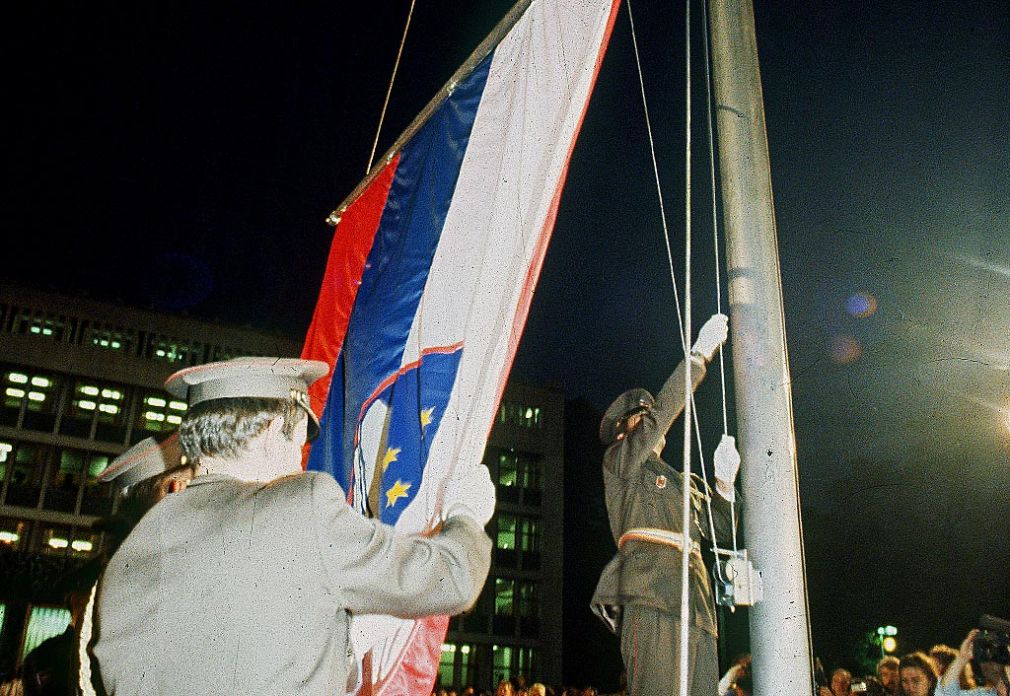The day after the adoption of the basic documents of independence, the solemn proclamation of an independent and sovereign Slovenia followed. It was Wednesday, 26 June 1991. A rather uncertain day, as the movements of tank columns in the Primorska region had already begun.
The MPs took a break after a several-week marathon of parliamentary sessions, at which they adopted constitutional amendments on new state symbols, so to speak, at the last minute, as it was threatened that Independence Day would be awaited with a red star. Police officers and members of the Territorial Defence were also given new symbols, but the main event was a session on 25 June 1991, at which foreign journalists were crowding.
Military planes over Ljubljana
Regardless of the day that announced the big ceremony at Revolution Square (today Republic Square) in front of the parliament building, there was quite a bit of uncertainty in the air. Foreign statesmen who were invited to the celebration cancelled their participation, and even Croatian President Franjo Tuđman announced that he would not be in Ljubljana. Some provincial governors from Austria nevertheless, attended the ceremony. The Federal Air Traffic Control Administration closed all three Slovenian airports (Ljubljana, Maribor, Portorož), and the situation began to worsen in the Primorska region, where YPA units were already moving towards border crossings. One of the lines was stopped by a barricade at Črni Kal, and the soldiers continued on foot. In the evening, crowds were already gathering on Ljubljana’s Revolution Square, and military planes were flying over Ljubljana. There was also a lot of inconvenience with the forgotten new Slovenian flag, which was supposed to be raised on Revolution Square, but the embarrassment was solved by the athlete Boris Strel, who brought a spare flag.
When dreams were allowed …
The police brass orchestra announced the official start of the celebration at 9.15 p.m. The President of the Presidency, Milan Kučan, Prime Minister Lojze Peterle, and President of the Assembly, France Bučar, walked out of the assembly building. Accompanied by the Chief of Staff of the Territorial Defence, then Colonel Janez Slapar, Kučan inspected the honorary unit of the Territorial Defence, and the report was handed over to him by the commander, Lieutenant Colonel Anton Krkovič. This was followed by Kučan’s solemn address, which left a rather strong artistic impression, as it was charged with emotions and was interrupted by the applause of those present several times. The address ended with the following ambiguous words: “Tonight dreams are allowed; tomorrow is a new day.” Most understood these words as an announcement of the impending danger, as the very next day the war spread over the whole country. But we only began to understand the true meaning of these words years later.
Blessing of a linden tree without a microphone
After the speech of the President of the Presidency, the Slovenian national anthem followed, during which they lowered the old flag with a red star and raised the new flag to the enthusiastic applause of the crowd (of course, many firecrackers exploded in between). Later, the honorary unit of the Territorial Defence left the venue to the sound of the European anthem, Beethoven’s “Ode to Joy”, and the celebration continued with a cultural programme. The united mixed choir sang the song “Slovenian Land” by Benjamin Ipavec, Župančič’s Toast was recited by the actor Polde Bibič (“Brothers, need we more words? We love this damn world, Kajfež, whoever is against!”). The Archbishop of Ljubljana, Alojzij Šuštar, blessed the linden tree, the text was also read by the senior of the Evangelical Church Ludvik Novak, but none of them got a microphone, so most of the participants at the celebration did not even know what was happening. This was followed by a performance by the Slovenian Octet (“Homeland” by Benjamin Ipavec), followed by trumpeters with the song “Triglav, my home”, and a video from Triglav, where hikers brought the Slovenian flag (without the coat-of-arms). The celebration officially ended with fireworks and the song “Given to the Heart” (Aleksander Mežek), which was recorded two years earlier, but just then became a kind of symbol of independence.
Gašper Blažič


